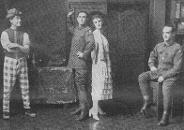Played out over three acts and set somewhere in France during the First World War, the first act opens with a bunch of solders taking R and R in an estaminet run by Mademoiselle Mimi. They sing, spin yarns and gibe with cutting satire at their officers, the War Office and each other. The Sydney Morning Herald records that 'all sorts of amusing figures flit to and fro - the haw haw solider who wears a monocle and addresses his officer as "dear old thing;" the stupid recruit, who unable to read or write, is promptly drafted into the Intelligence Corps; an irate military representative who will not permit the tribunal to grant an exemption to cripples, since he affirms a mahogany leg is equally as good as a heart of oak' (29 March 1920, p.5).
The second act sees the soldiers heading off to the front, joined by Mimi. Here they find themselves grouped around a camp fire in an old barn, relieving the tension of waiting for the big surge by singing songs and telling stories. The finale is played out as bombs whistle overhead and the soldiers sing 'Where Did That One Go.' The scene ends with the roof of the barn collapsing and the soldiers emerging scared but unhurt as the stage becomes obscured by smoke. In the last act the "piquant hostess" Mimi returns to her inn dreading the inevitable roll-call that will follow the inevitable heavy losses.
Songs incorporated into 1920 production included: 'On the Staff' (sung by Arthur Keighley), 'Yarrawonga' and 'The Heart-Breaking Baby Doll' (Hugh Gannon). The 1922 one act revival, presented as Hello Mimi, also included 'On the Staff' (sung by Lorne O'Brien), along with: 'Happy' (Lindsay Kemble), 'Lancashire Jazz Band' (George Jennings), 'Wonderful Mother of Mine' (Roy Glenister), 'Some Girls' (Will Saunders and George Jennings), 'What Do You mean' (Jennings and Kemble), 'Cross-Eyed Clara' (Jennings), 'They Never leave You Alone' (Kemble), 'Lovin' Disposition' (O'Brien), 'Wonderful Mother of Mine' (Glenister) and 'Goodbye Khaki' (Kemble).
[Source: Australian Variety Theatre Archive]

